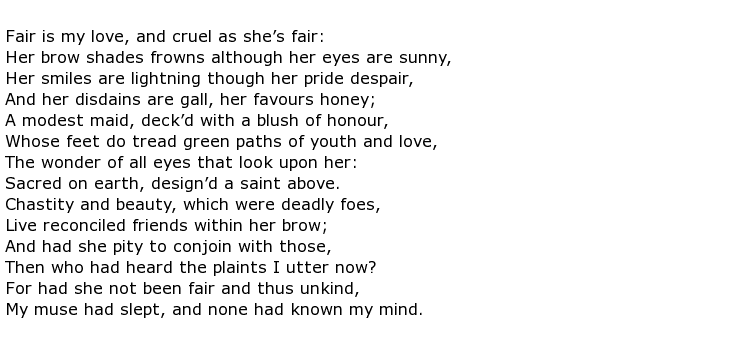 Samuel Daniel is generally known as an English poet and historian who was, indeed, fortunate to be born at a glorious time in English history. The Elizabethan era was into its fourth year when Daniel was born and he grew up enjoying the benefits of this time of great learning and international adventures. This was a good time to be a writer and he shared the stage with such luminaries as William Shakespeare and Ben Jonson. History has judged Daniel to be a poet of little importance and influence but there is no doubt that his work was in favour at the time he wrote it, hence his appointment (albeit for a short time) as Poet Laureate.
Samuel Daniel is generally known as an English poet and historian who was, indeed, fortunate to be born at a glorious time in English history. The Elizabethan era was into its fourth year when Daniel was born and he grew up enjoying the benefits of this time of great learning and international adventures. This was a good time to be a writer and he shared the stage with such luminaries as William Shakespeare and Ben Jonson. History has judged Daniel to be a poet of little importance and influence but there is no doubt that his work was in favour at the time he wrote it, hence his appointment (albeit for a short time) as Poet Laureate.
Samuel Daniel was born in Taunton, Somerset in 1562, and his father was a music master. While Samuel grew up favouring the writing of poetry and prose his brother John was a noted musician who was appointed to offices at Queen Elizabeth’s court at various times. Samuel attended college at Magdalen Hall, which was a college in Oxford between 1579 and 1582 and followed this up with a time of study into philosophical matters and the writing of poetry. He was appointed to a position in the offices of the then English Ambassador based in France in 1585 and then spent some time travelling in Italy.
When he returned to England Daniel became a private tutor to the future Earl of Pembroke, William Herbert, and it was here that he received great encouragement in his writing from the Pembroke Countess. In fact it is said that it was she who taught him how to construct good poetry. A period of employment at Skipton Castle with Lady Anne Clifford in Yorkshire followed.
It is generally believed that Daniel’s first published work was Paulus Jovius, which was a translated work in 1585 while his first collection of poems dates from 1592. It contains sonnets that were meant to be to Delia who was an inspiration to him when he was in Italy (it is believed that she lived on the banks of the Avon river, which was also known as Shakespeare’s). Here is Delia V1:

His work received royal attention at this time and he produced a Panegyric Congratulatorie in 1603, written to mark the succession of the new King James I. Giovanni Florio, his brother in law recommended him and he was then accepted at court. A prestigious court appointment soon followed – where he was required to write a series of pastoral tragicomedies and masques.
In 1605 he wrote The Tragedy of Philolas which, for a time, brought his name into disrepute at court. He used as background for the story the real events of the Earl of Essex’s rebellion in 1600 and seemed to portray Essex in a “sympathetic light”. It was only when he added a written apology to the preface of this play that he was forgiven and his reputation at court restored to favour.
The rest of Daniel’s life was spent in writing historical pieces covering very early times up to the kingship of Edward III in the 14th century and he enjoyed a very comfortable existence. In fact he was, at that time, regarded as one of the best writers of his time. He wrote in an easy, graceful style, somewhat lacking in fire and passion. As he neared the end of his life he gave up all activities and titles associated with the court and settled to a simple life on a farm close to Devizes in the county of Wiltshire.
Samuel Daniel died in October 1619, aged 57.

